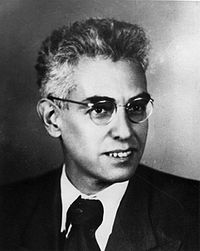Alexander Luria Scientist
Alexander Romanovich Luria (Russian: Алекса́ндр Рома́нович Лу́рия; 16 July 1902 – 14 August 1977) was a Soviet neuropsychologist and developmental psychologist. He was one of the founders of Cultural-Historical Psychology, and a leader of the Vygotsky Circle. Luria's magnum opus was his textbook on neuropsychology, Higher Cortical Functions in Man (1962), which has been translated into multiple languages and which he supplemented with The Working Brain in the 1970s. Apart from his work with Vygotsky, Luria is widely known for two extraordinary psychological case studies: of a man with a highly advanced memory, published as "The Mind of a Mnemonist", and of a man with traumatic brain injury, published as "The Man with a Shattered World". During his career Luria worked in a wide range of scientific fields at such institutions as the Academy of Communist Education (1920-1930s), Experimental Defectological Institute (1920-1930s, 1950-1960s, both in Moscow), Ukrainian Psychoneurological Academy (Kharkiv, early 1930s), All-Union Institute of Experimental Medicine, and the Burdenko Institute of Neurosurgery (late 1930s).
Search
Scientist
| Field of study | |
|---|---|
| influenced | |
| influenced by |
Topical connections
Alexander Luria on Wikipedia
External resources
- http://braininfo.rprc.washington.edu/indexotheratlas.aspx?othersiteID=1045244870
- http://fusionwriter.com/small-book-big-memory
- http://luria.ucsd.edu
- http://marxists.org/archive/luria/index.htm
- http://www.scribd.com/doc/12983496/Alexander-Luria-The-Mind-of-a-Mnemonist
- http://www.springer.com/home?SGWID=0-0-1003-0-0&aqId=1811333&download=1&checkval=0907c49169f19f7eba2658bf481c1bb9
- http://www.springerlink.com/content/b34101p383588v95
